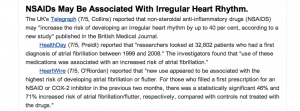Reports documenting the dangers of Non-Steroidal-Anti-Inflammatory Drugs (NSAIDs) continue to generate headlines. It’s a steady stream of bad news for patients who take these widely-available pain relievers.
Sorry about the repetition folks, but it’s hard to ignore my daily email updates from the American College of Cardiology when they so directly pertain to endurance athletes.
Here’s a snapshot of the headline that came today:
I have written many times before about how people who take NSAIDs have higher risks of:
And it is already well established that NSAIDs exacerbate gastro-esophageal reflux, and cause stomach ulcers and internal bleeding.
This week in the British Medical Journal, a group of researchers from northern Denmark published yet another trial suggesting NSAIDs increase the risk of atrial fibrillation (AF). Their report was an observational look-back study of 32,602 patients admitted to the hospital with AF. When they compared these patients to an age and sex matched control group (325,918), they found:
- Patients who took NSAIDs had a 17-27% higher risk of being admitted to the hospital with AF.
- Patients who filled a new prescription (within 60 days) for NSAIDs had an even higher risk of developing AF: Non-selective NSAIDs (ibuoprofen and naproxen) advanced the risk of AF by 40%, while the prescription-strength COX-2 inhibitors (diclofenac-Voltaren, Etodolac-Lodine, celecoxib-Celebrex) increased AF risk by a whopping 70%.
In an accompanying editorial, Dr Jerry Gurwitz, from the University of Massachusetts Medical School, emphasized the need for a “cautious†approach. At first glance, I thought he was urging doctors to be judicious in prescribing these agents.
But what this professor of Geriatrics really said was this:
“With uncertainty regarding a plausible biological mechanism, the susceptibility of case-control studies to unmeasured confounders, and inconsistent results in the two studies performed to date, a cautious approach seems warranted in applying the study’s results to the care of patients.”
Translation: Because Dr Gurwitz cannot explain how NSAIDs would cause AF (nobody can), and look-back studies like this one are often unreliable because of confounding variables (obesity and smoking), and this trial was not consistent with others, he was really urging doctors not to over-interpret the possible association of AF and NSAIDs.
Though I cannot disagree with Dr Gurwitz’s critique of association trials, I respectfully disagree with his placement of caution.
I urge my readers to exercise caution in taking NSAIDs. They are dangerous drugs.
In particular, aging endurance athletes that regularly trounce their bodies are at high risk for diseases associated with inflammation. Ingesting a drug which has so many potential adverse cardiovascular effects seems excessively risky–even for a crit racer.
Spread the word: Say no to NSAIDs!
JMM
Reference: NSAID use associated with risk of atrial fibrillation or flutter, by Michael O’Riordan, TheHeart.org.
